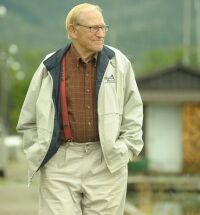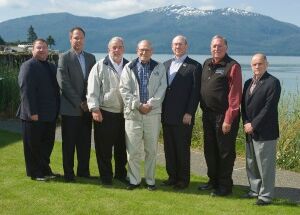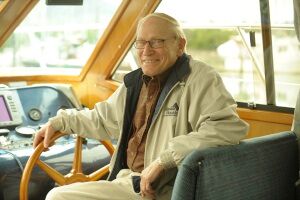Meet a Legend, Frank C. Roppel

Improving Housing in Alaska for Over 20 Years
Frank C. Roppel became involved in the housing industry not long after his permanent move from Oregon to Alaska in 1959. He saw the aftermath of the earthquake in 1964, in which the Alaska Housing State Authority (ASHA), AHFC’s predecessor, led the urban renewal work for years following the destruction. Since that initial involvement in Alaska’s housing industry, Roppel has been a critical asset in making Alaska a good place to raise a family. He worked with others across the state to overcome the housing market crash of the 1980s and has been at the core of many improvements to housing in Alaska.
“A lot of the marginal housing that was located in Anchorage as well as other parts of the state has really been significantly improved, and AHFC working at the direction of the legislature, has played a very significant role in that,” says Roppel. “I’m proud of those accomplishments.”

Serving AHFC with Dedication and Creativity
After 12 years of serving on the ASHA and AHFC boards in the 1970s and 1980s, then Governor Frank Murkowski appointed Roppel to the AHFC board of directors in July 2003, and the board elected him to serve as their chair. During his tenure, he was also named chairman of the Alaska Gasline Development Corporation, a subsidiary of AHFC that works to ensure energy supply stability to the citizens of the state. Being the chairman of the board for an organization like AHFC calls for extreme creativeness and ingenuity. While housing issues are complex in any area of the country, Alaska’s are particularly unique. “No area in the United States has the diversity of housing challenges that you find in Alaska,” says Roppel.
The rich diversity of Alaska communities directly affects the work AHFC does, and making a positive difference in remote villages is at the heart of the organization. The weather and isolation invoke customized resolutions depending on where in Alaska the housing need lies. “There is a powerful difference in the type of management and the type of thinking that you need to apply in the rural areas as opposed to Anchorage, which can only be considered a metropolitan area,” Roppel says. “The resources in the rural areas are limited, there’s a lack of building codes and transportation, and you have powerful weather issues.”
Leaving a Legacy of Opening Doors for Alaskans
Though the obstacles are vast, Roppel led AHFC to overcome many of these during the course of more than 20 years on the board. “It’s awfully easy when you’ve had good successes to become complacent and to rest on your laurels,” says Roppel, however, he believes it’s important for organizations like AHFC to look for opportunities to improve the lives of Alaskans.
“The challenges change but believe me, there will be powerful challenges that this group will have the opportunity and be asked to take on. AHFC is, in fact, an arm of the state of Alaska and we need to never forget that. You look at the projects that AHFC has been involved with — those have affected the lifestyles of a lot of folks. I’ve been to a lot of states where they don’t have organizations like AHFC. It has been a pleasure to be associated with such an organization.”

Frank Roppel resides in Wrangell, Alaska, a small town with a population of about 2,300, where he enjoys fishing, golfing, and boating. “It’s a great life,” says Roppel.
![Alaska Housing Finance Corporation [Logo]](/application/themes/ahf2/images/logo.png?v=2)